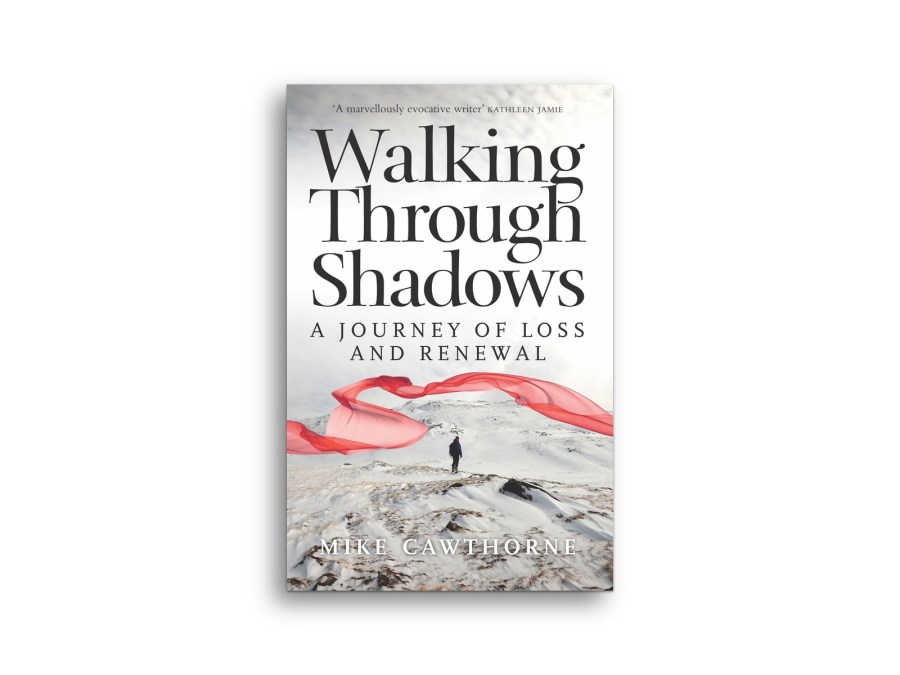Alex Roddie reviews a spellbinding new book about winter backpacking in the Scottish Highlands by Mike Cawthorne.
Mike Cawthorne is the author of several books on hillwalking and backpacking in the Scottish Highlands, including the critically acclaimed Hell of a Journey, which tells the story of his mission to climb all 135 Scottish peaks over 1,000m in height in winter. His latest book, Walking Through Shadows,describes a quest more esoteric, more wandering, but perhaps all the richer for it.
Mike and his friend Nick set out from the north coast of Scotland one winter to attempt a meandering backpacking route south towards Knoydart. This is a pilgrimage too, a voyage in memory of their friend Clive who died one winter in the hills, although there’s far more to it than that – this is also a quest for wildness and a route as far from paths and the logical line as possible. While his companion Nick (who is out of shape and suffers badly from swollen feet) often complains that there are quicker ways by following paths between glens, the author points out that paths can be a curb to ambition, channelling pilgrims into narrow corridors: “the point is it’s not about the easiest or quickest way. If your chosen way slows you and takes twice as long, all the better. It’s the experience that counts.”
And this is quite some experience. The winter weather is ferocious; they frequently have to deal with extremely challenging river crossings, chest-deep snow drifts, severe gales, and more. There’s a hair-raising account of a direct descent to Glen Shiel down an avalanche-prone slope in worsening weather. The sense of isolation is magnified (perhaps intentionally) by the fact that their supplies were all buried in advance; no detours to shops in settlements along the way! This is a purist backpacking experience.
The two main characters have many interesting discussions in their long, cold bothy nights, and these discussions sometimes spill over into arguments as the stresses of the journey make themselves felt. They debate rewilding, human nature, deep time, the Highland Clearances, consumerism, and more. Rewilding crops up again and again as they reflect on the denuded state of the uplands through which they roam. The author directs scathing criticism at estate management in the Highlands. While the tone sometimes veers towards bleak pessimism, their illogical, wandering route provides plenty of opportunities to see ecological recovery – there is hope expressed here too.
A third character is prominent in this tale: Clive Dennier, who died in 2013 after going missing in Knoydart. Numerous anecdotes of Clive’s adventures in the hills are sprinkled through the book and he’s described as a man who was spontaneous in his hillwalking, who relished storm and hardship. This sense of loss adds a poignant element to the story. The journey ends at the place where Clive’s body was eventually found near Kinloch Hourn.
The writing is intense, immersive, and a little fierce in places, with a rhythm that makes me think of ragged clouds tearing over a bealach in a gale. The Highlands are described as a wondrous landscape alive with hidden culture and ecology – albeit much of it now submerged in time. Walking Through Shadowsperfectly expresses the strange glory of walking long distances in the Highlands in winter, revelling in the solitude yet also humbled by the brutality. Nothing is romanticised here: this is raw, powerful writing that comes from a place of both great emotional intensity and intellectual depth. To conclude with a particularly memorable quote from the book: “In an age of leisure, all journeys are contrived, but that doesn’t make them any less real, or less important.”
Walking Through Shadows – A Journey of Loss and Renewal by Mike Cawthorne is published by Birlinn Books (£12.99)








